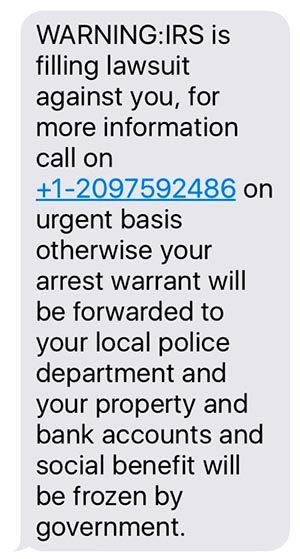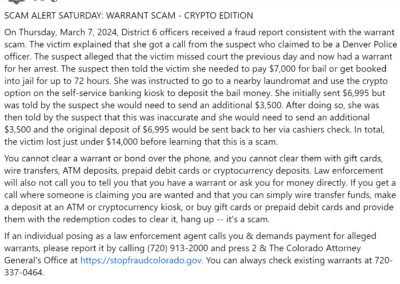Beware of Warrant Scams
How to Protect Yourself from Fraudulent Tactics
Warrant scams are a prevalent form of deception that preys on individuals’ fear and urgency to comply with supposed legal demands. Fraudsters impersonate law enforcement officials or government agencies, falsely claiming that the recipient has outstanding warrants or legal issues that require immediate resolution. In this blog post, we’ll uncover the mechanics of warrant scams and provide actionable strategies to safeguard yourself from falling victim to these fraudulent schemes.
Understanding Warrant Scams
Warrant scams typically unfold through the following steps:
-
Initial Contact: Scammers initiate contact with the victim via phone calls, emails, or text messages, posing as representatives from law enforcement agencies or government entities.
-
False Claims: Fraudsters falsely claim that the recipient has outstanding warrants or legal issues, alleging non-payment of taxes, missed jury duty, or involvement in criminal activities.
-
Urgency and Fear: To instill a sense of urgency and fear, scammers threaten legal consequences such as arrest, fines, or imprisonment if immediate action is not taken to resolve the alleged warrant.
-
Demand for Payment: Scammers demand immediate payment of fines, fees, or penalties to avoid arrest or legal repercussions. They may instruct the victim to provide payment via wire transfer, prepaid debit cards, or cryptocurrency to purportedly settle the warrant.
How to Protect Yourself from Warrant Scams
Protecting yourself from warrant scams requires vigilance and skepticism. Here are essential tips to safeguard against fraudulent tactics:
-
Verify Caller Identity: If you receive a call claiming to be from a law enforcement agency or government entity, verify the caller’s identity by requesting their name, badge number, and contact information. Legitimate authorities will provide this information and allow you to verify their credentials.
-
Don’t Panic: Remain calm and composed if you receive a call or message alleging the existence of a warrant against you. Scammers rely on instilling fear and urgency to coerce victims into making impulsive decisions.
-
Verify Warrant Status: If you’re unsure about the validity of a warrant claim, independently verify the status of any warrants or legal issues by contacting the relevant law enforcement agency or court directly. Do not use the contact information provided by the caller.
-
Avoid Immediate Payments: Refrain from making immediate payments or providing personal and financial information to callers alleging the existence of warrants. Legitimate authorities do not demand immediate payment over the phone and will provide official documentation if necessary.
-
Report Suspicious Activity: If you suspect you’ve been targeted by a warrant scam or have fallen victim to fraudulent tactics, report the incident to local law enforcement, the Federal Trade Commission (FTC), or the Consumer Financial Protection Bureau (CFPB). Reporting scams helps authorities take action and prevent further victimization.
Warrant scams exploit individuals’ fear and uncertainty to deceive them into making payments or divulging personal information under false pretenses. By staying informed, verifying caller identities, avoiding panic, verifying warrant status independently, refraining from immediate payments, and reporting suspicious activity, you can protect yourself from falling victim to warrant scams. Stay vigilant, trust your instincts, and empower yourself with knowledge to thwart fraudulent tactics aimed at compromising your financial and personal security.






